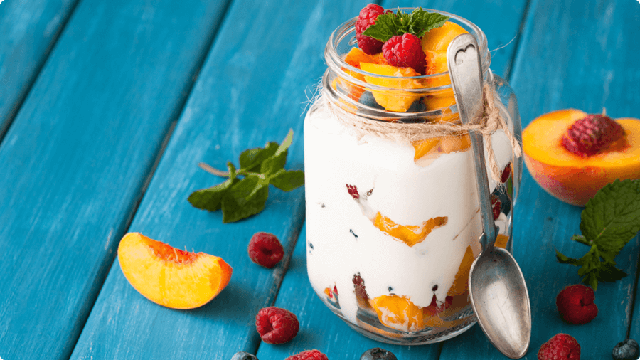Eat lots of fruits and vegetables
You should eat at least five portions of fruit and vegetables every day. These can be fresh, frozen, canned, dried or juiced. To make this easier, you could add a slice of banana to your breakfast cereal, or have a piece of fresh fruit as a mid-morning snack.
A portion of fresh, canned or frozen fruit and vegetables is 80g, plus a portion of dried fruit (which can be eaten with meals) is 30g. A glass of fruit or vegetable juice or smoothie is also good but should be limited as these drinks are often high in sugar and can cause tooth decay.
Eat plenty of fish, including fatty fish.
Fish is a good source of protein and is rich in vitamins and minerals. Aim to eat fish at least twice a week, including one serving of fatty fish. Fish is high in omega-3 fats, which may help prevent heart disease. Fatty fish include salmon, herring, and mackerel.
Cut down on saturated fat and sugar
You need some fat in your diet, but it's important to pay attention to the amount and type of fat you're eating.
There are two main types of fat: saturated and unsaturated. Too much saturated fat can raise blood cholesterol levels, increasing your risk of developing heart disease.
Regular consumption of foods and drinks high in sugar increases the risk of obesity and tooth decay.

You should eat at least five servings of fruit and vegetables every day.
Sugary foods and drinks are often high in energy (in kilograms or calories), and if consumed too often can contribute to weight gain.
Eat less salt: No more than 6g per day for adults.
Eating too much salt can raise your blood pressure. People with high blood pressure are more likely to have heart disease or stroke. Even if you don't add salt to your food, you can still eat too much.
About three-quarters of the salt you eat is already in the food you buy, such as breakfast cereals, soups, breads and sauces.
Drink plenty of water
You need to drink plenty of water to prevent dehydration. You should drink 6 to 8 glasses a day. This is the amount of fluid you get, in addition to the food you eat.

Don't skip breakfast.
All non-alcoholic drinks count, but water, low-fat milk, and lower-sugar drinks, including tea and coffee, are healthier options. Try to avoid sugary drinks and carbonated drinks, as they are high in calories. They are also bad for your teeth.
Don't skip breakfast
Some people skip breakfast because they think it will help them lose weight. But a healthy breakfast that is high in fibre and low in fat, sugar and salt can form part of a balanced diet, and can help you get the nutrients you need for good health.
Eat meals with higher fiber starchy carbohydrates
Starchy carbohydrates should make up more than a third of the foods you eat. These include potatoes, bread, rice, pasta, and cereals. Choose higher-fiber or whole-grain varieties, such as whole-wheat pasta, brown rice, or potatoes with the skin on.
They contain more fiber than white or refined starchy carbohydrates and can help you feel fuller for longer. You should maintain 1 starchy food with each main meal.
Source: https://giadinh.suckhoedoisong.vn/nhung-cach-an-uong-lanh-manh-giup-duy-tri-suc-khoe-tot-moi-ngay-172250415213808237.htm


![[Photo] In May, lotus flowers bloom in President Ho Chi Minh's hometown](https://vphoto.vietnam.vn/thumb/1200x675/vietnam/resource/IMAGE/2025/5/15/aed19c8fa5ef410ea0099d9ecf34d2ad)
![[Photo] President Luong Cuong attends the National Ceremony to honor Uncle Ho's Good Children](https://vphoto.vietnam.vn/thumb/1200x675/vietnam/resource/IMAGE/2025/5/15/9defa1e6e3e743f59a79f667b0b6b3db)


![[Photo] Prime Minister Pham Minh Chinh receives Country Director of the World Bank Regional Office for Vietnam, Laos, Cambodia](https://vphoto.vietnam.vn/thumb/1200x675/vietnam/resource/IMAGE/2025/5/15/2c7898852fa74a67a7d39e601e287d48)




















![[Photo] Close-up of An Phu underpass, which will open to traffic in June](https://vphoto.vietnam.vn/thumb/1200x675/vietnam/resource/IMAGE/2025/5/15/5adb08323ea7482fb64fa1bf55fed112)





































































Comment (0)